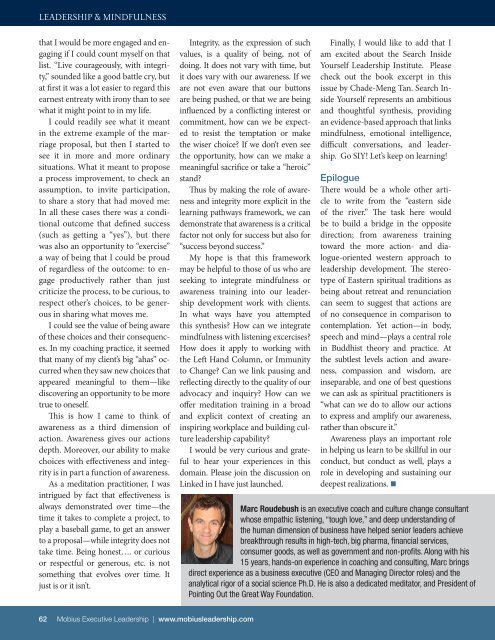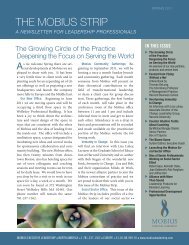Leadership & Mindfulness - Mobius Executive Leadership
Leadership & Mindfulness - Mobius Executive Leadership
Leadership & Mindfulness - Mobius Executive Leadership
You also want an ePaper? Increase the reach of your titles
YUMPU automatically turns print PDFs into web optimized ePapers that Google loves.
LEADERSHIP & <strong>Mindfulness</strong>that I would be more engaged and engagingif I could count myself on thatlist. “Live courageously, with integrity,”sounded like a good battle cry, butat first it was a lot easier to regard thisearnest entreaty with irony than to seewhat it might point to in my life.I could readily see what it meantin the extreme example of the marriageproposal, but then I started tosee it in more and more ordinarysituations. What it meant to proposea process improvement, to check anassumption, to invite participation,to share a story that had moved me:In all these cases there was a conditionaloutcome that defined success(such as getting a “yes”), but therewas also an opportunity to “exercise”a way of being that I could be proudof regardless of the outcome: to engageproductively rather than justcriticize the process, to be curious, torespect other’s choices, to be generousin sharing what moves me.I could see the value of being awareof these choices and their consequences.In my coaching practice, it seemedthat many of my client’s big “ahas” occurredwhen they saw new choices thatappeared meaningful to them—likediscovering an opportunity to be moretrue to oneself.This is how I came to think ofawareness as a third dimension ofaction. Awareness gives our actionsdepth. Moreover, our ability to makechoices with effectiveness and integrityis in part a function of awareness.As a meditation practitioner, I wasintrigued by fact that effectiveness isalways demonstrated over time—thetime it takes to complete a project, toplay a baseball game, to get an answerto a proposal—while integrity does nottake time. Being honest…. or curiousor respectful or generous, etc. is notsomething that evolves over time. Itjust is or it isn’t.Integrity, as the expression of suchvalues, is a quality of being, not ofdoing. It does not vary with time, butit does vary with our awareness. If weare not even aware that our buttonsare being pushed, or that we are beinginfluenced by a conflicting interest orcommitment, how can we be expectedto resist the temptation or makethe wiser choice? If we don’t even seethe opportunity, how can we make ameaningful sacrifice or take a “heroic”stand?Thus by making the role of awarenessand integrity more explicit in thelearning pathways framework, we candemonstrate that awareness is a criticalfactor not only for success but also for“success beyond success.”My hope is that this frameworkmay be helpful to those of us who areseeking to integrate mindfulness orawareness training into our leadershipdevelopment work with clients.In what ways have you attemptedthis synthesis? How can we integratemindfulness with listening excercises?How does it apply to working withthe Left Hand Column, or Immunityto Change? Can we link pausing andreflecting directly to the quality of ouradvocacy and inquiry? How can weoffer meditation training in a broadand explicit context of creating aninspiring workplace and building cultureleadership capability?I would be very curious and gratefulto hear your experiences in thisdomain. Please join the discussion onLinked in I have just launched.Finally, I would like to add that Iam excited about the Search InsideYourself <strong>Leadership</strong> Institute. Pleasecheck out the book excerpt in thisissue by Chade-Meng Tan. Search InsideYourself represents an ambitiousand thoughtful synthesis, providingan evidence-based approach that linksmindfulness, emotional intelligence,difficult conversations, and leadership.Go SIY! Let’s keep on learning!EpilogueThere would be a whole other articleto write from the “eastern sideof the river.” The task here wouldbe to build a bridge in the oppositedirection; from awareness trainingtoward the more action- and dialogue-orientedwestern approach toleadership development. The stereotypeof Eastern spiritual traditions asbeing about retreat and renunciationcan seem to suggest that actions areof no consequence in comparison tocontemplation. Yet action—in body,speech and mind—plays a central rolein Buddhist theory and practice. Atthe subtlest levels action and awareness,compassion and wisdom, areinseparable, and one of best questionswe can ask as spiritual practitioners is“what can we do to allow our actionsto express and amplify our awareness,rather than obscure it.”Awareness plays an important rolein helping us learn to be skillful in ourconduct, but conduct as well, plays arole in developing and sustaining ourdeepest realizations. ■Marc Roudebush is an executive coach and culture change consultantwhose empathic listening, “tough love,” and deep understanding ofthe human dimension of business have helped senior leaders achievebreakthrough results in high-tech, big pharma, financial services,consumer goods, as well as government and non-profits. Along with his15 years, hands-on experience in coaching and consulting, Marc bringsdirect experience as a business executive (CEO and Managing Director roles) and theanalytical rigor of a social science Ph.D. He is also a dedicated meditator, and President ofPointing Out the Great Way Foundation.62 <strong>Mobius</strong> <strong>Executive</strong> <strong>Leadership</strong> | www.mobiusleadership.com



